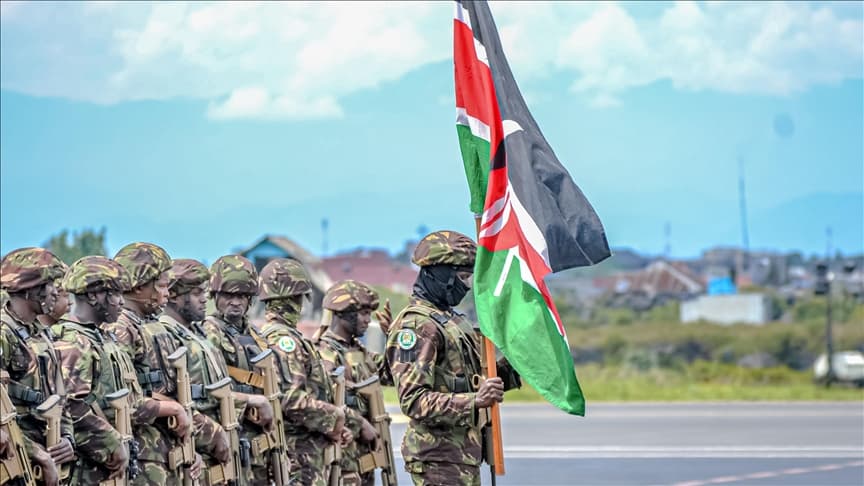We're loading the full news article for you. This includes the article content, images, author information, and related articles.
Nairobi has verified that hundreds of its citizens, including ex-security officers, have been deceptively recruited into the conflict, prompting high-level diplomatic intervention and warnings to the public.

NAIROBI, KENYA – The Government of Kenya confirmed on Wednesday, November 12, 2025, that more than 200 of its citizens are actively fighting for the Russian Federation in its ongoing war against Ukraine. In a statement from the Ministry of Foreign Affairs, Prime Cabinet Secretary Musalia Mudavadi described the development as "extremely worrying," revealing that recruitment networks remain active in both Kenya and Russia, targeting nationals with deceptive offers.
The announcement provides official confirmation to reports that have circulated for months regarding the trafficking of young Kenyans into the European conflict. According to the government, some of the recruits are former members of Kenya's disciplined services. This revelation underscores the sophisticated nature of the recruitment schemes, which exploit the economic vulnerabilities of Kenyans seeking employment abroad.
Investigations by Kenyan authorities and international reports indicate that recruits are lured with promises of substantial financial compensation, with some offers reaching as high as KSh 2.7 million (approximately $18,000) to cover visas, travel, and accommodation. However, the reality upon arrival is starkly different. Many Kenyans who were promised safe, non-combat roles—such as drone assembly, painting, or handling chemicals—found themselves thrust onto the frontlines with minimal training.
In September 2025, a multi-agency security team raided a residence in Athi River, rescuing 21 individuals who were being prepared for deployment to the war zone. An agent allegedly coordinating the illicit recruitment was arrested and is facing prosecution. The Ministry of Foreign Affairs stated that Kenya's embassy in Moscow has recorded cases of injuries among the Kenyan recruits, further highlighting the perilous conditions they face.
The Ukrainian government has corroborated these concerns on a continental scale. On Friday, November 7, 2025, Ukrainian Foreign Minister Andrii Sybiha stated that over 1,400 individuals from 36 African nations are fighting for Russia. Sybiha described the military contracts offered by Moscow as being "equivalent to a death sentence," asserting that most foreign fighters are sent on high-risk missions, or "meat assaults," where they are quickly killed.
The situation has escalated to the highest levels of Kenyan diplomacy. President William Ruto confirmed in a social media post on Friday, November 8, 2025, that he had spoken with Ukrainian President Volodymyr Zelenskyy regarding the "young Kenyans who have been illegally recruited to fight in the war." President Ruto stated he had requested his Ukrainian counterpart to "facilitate the release of any Kenyan in Ukrainian custody," an appeal President Zelenskyy reportedly accepted.
This diplomatic engagement highlights the complex position Kenya finds itself in, with its citizens caught on both sides of the conflict—some fighting for Russia and others potentially held as prisoners of war by Ukraine. The Kenyan government has reiterated its commitment to international law, including the 1989 UN Convention against the Recruitment, Use, Financing, and Training of Mercenaries.
Kenya is not the only African nation grappling with this issue. South Africa's government announced on Thursday, November 6, 2025, that it was investigating how 17 of its nationals became stranded in the Donbas region of Ukraine after being lured into mercenary forces with promises of lucrative jobs. These incidents point to a broader, coordinated effort by recruitment networks to draw fighters from developing nations into the conflict, often through coercion and deception.
The economic pressures and high unemployment rates in countries like Kenya create a fertile ground for such predatory recruitment. The government has urged citizens to exercise extreme caution with overseas job offers that appear unrealistically attractive and to verify the legitimacy of recruitment agencies through the National Employment Authority (NEA). As the war in Ukraine continues, the exploitation of foreign nationals remains a grave humanitarian and diplomatic challenge for Kenya and the wider international community.
Keep the conversation in one place—threads here stay linked to the story and in the forums.
Sign in to start a discussion
Start a conversation about this story and keep it linked here.
Other hot threads
E-sports and Gaming Community in Kenya
Active 9 months ago
The Role of Technology in Modern Agriculture (AgriTech)
Active 9 months ago
Popular Recreational Activities Across Counties
Active 9 months ago
Investing in Youth Sports Development Programs
Active 9 months ago